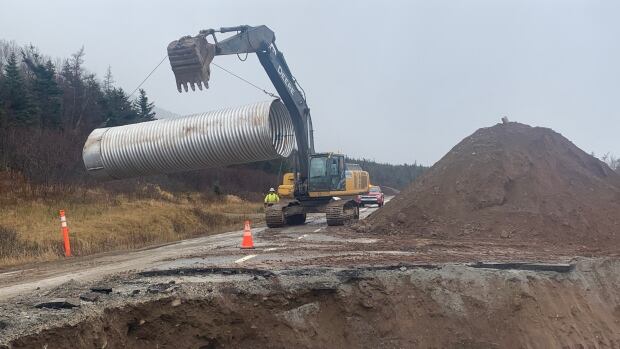
Washed out sections of TCH near Port aux Basques to begin reopening to traffic Monday
CBC
Some damaged roads on Newfoundland's southwest coast will soon reopen as work continues to repair damage and support those in need after heavy rains washed through the area earlier this week.
Premier Andrew Furey says crews are sticking to the initial one-week timeline for clean-up and repairs to be completed.
He expects a washout east of Channel-Port aux Basques to be repaired "within the next 24 to 48 hours."
"That will re-establish the medical appointments for them and then hopefully as the week progresses, the one closer to Port aux Basques will be re-established," Furey said Sunday on Rosemary Barton Live.
The Department of Transportation and Infrastructure released a statement Sunday morning saying two of the four areas of the Trans-Canada Highway that were washed out during the storm will re-open Monday, with traffic reduced to one lane in some areas.
The Department anticipates the areas near the Port aux Basques weigh scales and at Little Paradise Park to reopen mid-week.
Furey said the flow of goods and supplies into Channel-Port aux Basques is continuing, and military personnel are on the ground in Stephenville to help transport residents out of isolated areas via helicopter.
A spokesperson for the Canadian Armed Forces told CBC News on Sunday that two CH-146 Griffon helicopters and 18 members of the helicopter detachment have arrived in Stephenville. Work is still being done to determine if land forces will be needed, the spokesperson said.
A coast guard helicopter also moved about 180 kilograms of medical supplies from Stephenville to Port aux Basques late Sunday morning.
Furey said residents of Newfoundland's west coast "are well-versed and prepared for storms," but said the damage in the area illustrates the need for strategies to mitigate coastal erosion.
"We'll never be fully ahead of mother nature," he said.
"That is not the way it works. We need to work with municipalities … and our federal partners to ensure that especially the coastal communities are well-protected."
Bob Robichaud, a warning preparedness meteorologist with the Canadian Hurricane Centre, says powerful systems like the one that soaked Atlantic Canada in record rainfall amounts of 300+ millimetres aren't as rare as they used to be.
"It hasn't been that long since that same kind of setup has caused some issues before," he said, "so it seems to be happening more and with a warmer atmosphere."





















 Run 3 Space | Play Space Running Game
Run 3 Space | Play Space Running Game Traffic Jam 3D | Online Racing Game
Traffic Jam 3D | Online Racing Game Duck Hunt | Play Old Classic Game
Duck Hunt | Play Old Classic Game